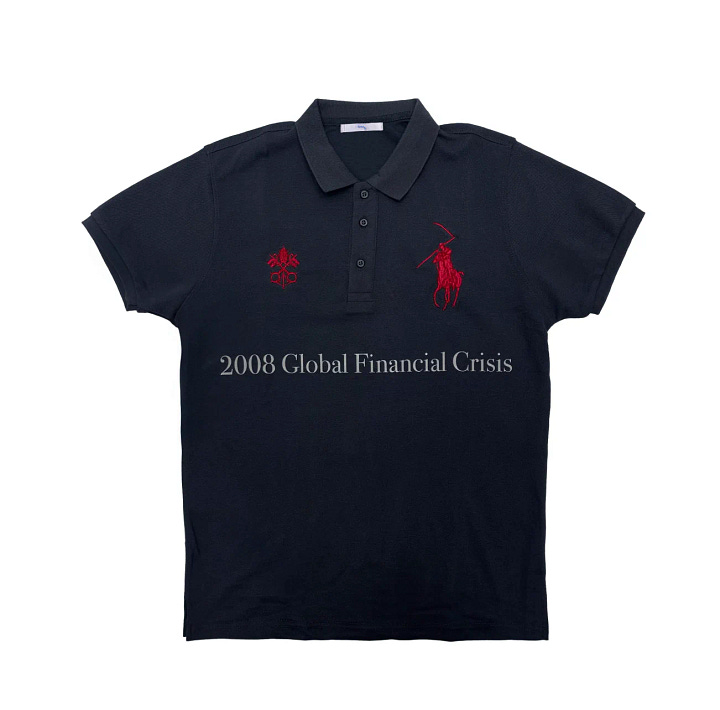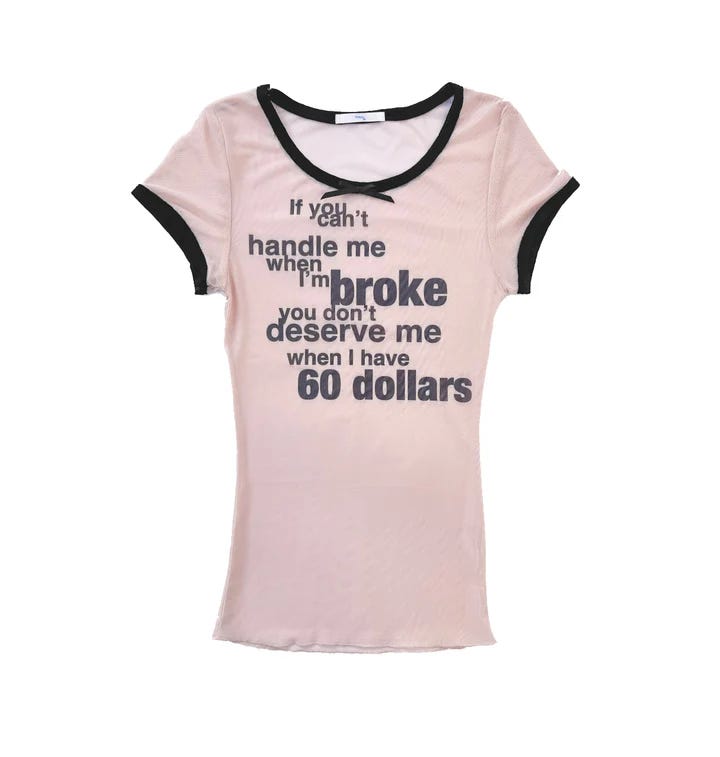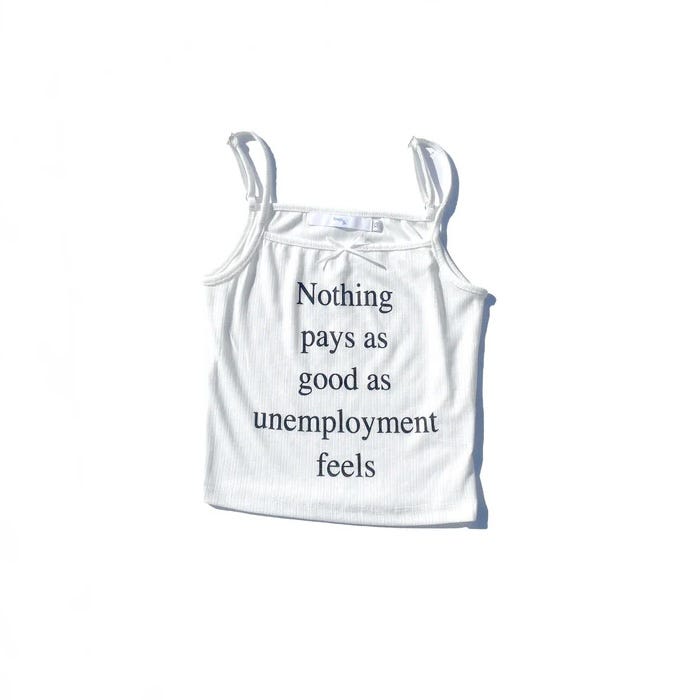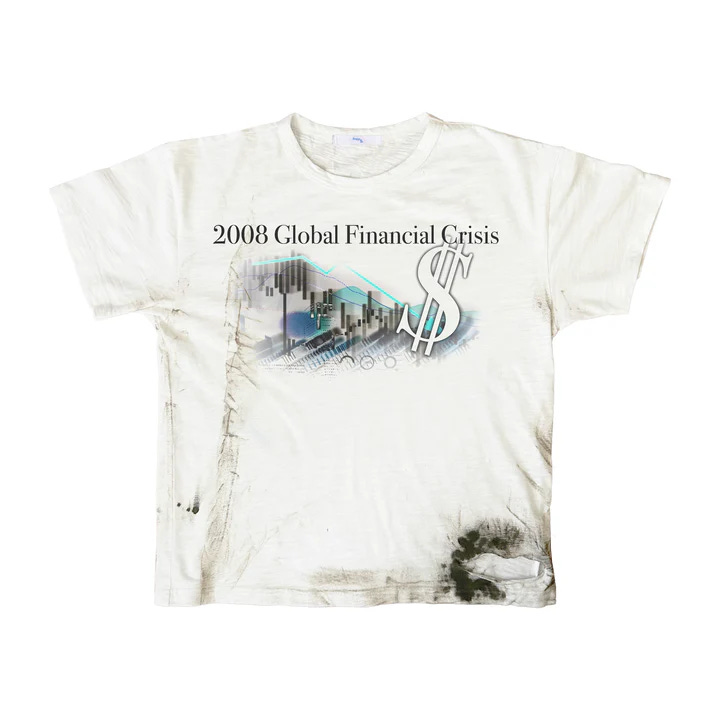“How much can I get away with and still go to heaven?” is a question posed on the ass of a pair of short shorts for sale on prayingg.com. While such a query might be a hymn to the ears of a generation of aging shitposters and ironic spiritualists, it also reveals the crux of the Praying ethos. How far is too far? How sheer is too sheer? How many dirt-splattered Gildan polos are too many? So far, it seems the limit doesn’t exist. But really, does it even matter?
Born from the corporate boredom of two millennial marketing execs, Skylar Newman and Alexander Haddad, the brand quickly found success by printing ambiguously ironic sayings in Times New Roman Regular onto a variety of wholesale garments and accessories. They are responsible for masterminding the infamous Holy Trinity bikini—you know, the one Addison Rae posted a photo of herself in and promptly deleted—and the God’s Favorite camo hat that is seemingly owned by every gentrifying man, woman, and child south of 14th Street.
There are several elements of the Praying brand that feel icky. Aside from their marketing of itty bitty clothing in photoshoots with “porno” vibes, their FW25 collection takes a brazen approach to macroeconomic crises. In the brainrot-ified Praying universe, anything and everything is fair game. Russia, China, COVID, taxes, incels, and much, much more are all fair targets. If Anna and Dasha have discussed it on the pod, it’s a safe bet Praying has it printed on a thong. And that thong will set you back $65.
On the Praying website, a black baseball hat listed for $65 reads “‘studies’ suggest… ‘experts’ are saying… ‘scientists’ believe that. according to ‘research.’ 87% of ‘people’ believe.” Baby tees in varying color ways are branded with “nothing pays as good as unemployment feels,” a recurring slogan, playing off the expression “nothing tastes as good as skinny feels,” spoken into infamy by author and perfector of the heroin-chic aesthetic, Kate Moss.
For their FW25 collection, Newman and Haddad respond to the aura of austerity that clouds the 21st century by taking nothing seriously—a coping mechanism which has grown popular in the years following the pandemic. A multinational study conducted by researchers at The University of Bath, NYU Langone Health in 2021 found that 56% of Gen-Z believed that “humanity is doomed”1 with only 21% of Gen-Z Americans asserting their government was trustworthy—resulting in the lowest scores out of the surveyed countries (Australia, Brazil, Finland, France, India, Nigeria, the Philippines, Portugal, the U.K., and the U.S.).




Shawn, a Praying buyer from New Jersey, was lured into purchasing the items from an Instagram ad, thinking the Hail Mary zip-up was “funny and cute.” She subsequently found the “I'm with her” Melania Trump sweatshirt and SkinNY baseball caps to be “tasteless, a bit unethical, and a little try-hard.”
At first glance Praying might seem like a liberal cynic’s paradise. Upon further inspection, at best, it illustrates a fashionably edgy neo-nihilism, or, at worst, a sinister conservative energy—depending on what you believe has taken over the “downtown” New York scene. This prevents shoppers like Shawn from making further purchases. “The brand became synonymous with a ‘type’ of Dimes Square ‘is she a Republican, is she not?’ red scare-wannabe that I don’t really like being associated with, so wearing the clothes now makes me feel like I’m being perceived as that kind of grasping personality.” She’s not wrong to think this way.
Never fully recovered from Bernie’s loss in 2016, a good chunk of progressives traded their jovial New Dem optimism for the cynical “realism” so often associated with their political counterparts.
In reference to the newly converted, Russian-American filmmaker Evgenia Kovda puts it best:
“In 2025, all pretense to morality or social justice is gone. Nothing matters, all empathy is “emotional manipulation,” and any attempt to make the world a better place through politics is cringe and demented. They changed their politics as quickly as they changed their clothes—now they are all into laces and heels and tight leather outfits, rather than a unisex grungy look. In doing so they engaged in the same simplistic herd mentality as the woke libs they supposedly hated.”2
Using satire as a weapon to combat existential blues is nothing new, but there’s a line—admittedly blurry—between what is authentic and what is exploitative. And Praying is in good company. Vetements and Balenciaga love an ironic runway moment, and Golden Goose charges $500 a pop for their poverty-core shoes, haters be damned.
Mocking the commodity struggle has been in fashion for years, but Praying does it in a way that directly entices some particularly detached folks and comes with a marginally more reasonable price tag. Although, as Haddad points out in an interview with AltPress, Praying acknowledges the absurdity of their markups, saying,
“The concept of making stuff that is devalued and targeted at a specific consumer was so mind blowing to me. [TJMaxx is] basically making trash that is designed for a specific kind of person. If we made a shirt that said ‘Never trust a skinny cook,’ we would put it at a higher price point for Praying due to the aesthetic and shoots that we do, but in TJ Maxx, the same thing would be eight dollars on the clearance rack.”
Ethel Cain, a contemporary folk artist known for her profoundly serious energy, has called attention to the unseriousness of modern youth in a “drunk rant” on Tumblr, saying: “We are in an irony epidemic. There is such a loss of sincerity and everything has to be a joke at all times.” And Cain certainly is not the first to notice. David Foster Wallace has famously long held the belief that “[..]postmodern irony and cynicism’s become an end in itself, a measure of hip sophistication and literary savvy. Few artists dare to try to talk about ways of working toward redeeming what’s wrong, because they’ll look sentimental and naive to all the weary ironists.”3 It is perhaps this evasive anti-moralism that stokes the flames of Praying’s tongue-in-cheek spirit and their—assumably sizable—profit margins.
Mixing irony with a point of sale seems particularly bizarre. Money spent, however ironically, is legal tender, and there’s nothing more serious than the law. The muddled binaries of ironic and unironic purchases only further the agenda of the “YOLO economy,” a term colloquially used in marketing spheres to target Zoomer nihilists, or more aptly, “Doomers.” For America’s youth, cash has the same value as Monopoly money. We’ve been told we will never afford retirement or own a house. So, rather than fighting for cushy financial futures, our nouveau nihilism (also marketing lingo) tells us we might as well spend our paychecks on tasty treats to seize any form of pleasure that comes our way, and ironic tees to opt out of caring about anything that may fatefully disappoint.
The purpose of the ironic shirt has corroded significantly since its tuxedo t-shirt humble beginnings. The layers of social commentary are so stratified that even its patrons don’t know why their shirt is funny—or serious—or both. A satirical MAGA spin-off hat loses its humor if it’s mistaken by a Trumper for the real deal. This murkiness might just be the problem with fashion’s newfound entanglement with ironic nihilism: it’s so shrouded in obscurity that you can’t tell who is or isn’t genuinely suicidal, a Nazi, or just making an empty statement that regardless—to quote a Praying tee—“who cares a fuck?”
As the country proceeds to fade into dystopia under new overlords, and we continue to live under the threats of bird flu, climate change, expansive AI, and the like, is now the time to get serious? Or shall we simply lol and shitpost until the actual end of days?
What may have started out as a subtle nod to nihilism with “Holy Spirit” printed on the crotch of a bikini, has devolved into capitalizing on a palpable, generational despair. Haddad’s background in philosophy seems to agree, telling Highsnobiety the brand itself is inspired by “The idea that the world is broken beyond repair.” Though it’s hard to disagree, I can’t say this sentiment justifies spending $190 on a “Towel Shroud Hoodie.”
Praying and their merchandise, at face value, is funny. The “KYS” product line—K.Y.S standing for “Know Your Self”—is a particularly deranged example. Sure, it can be hard to resist a giggle in the face of suicide and economic devastation, but is screen-printing it on a baby tee really as harmless as we think it is? To call back upon the booty shorts, how much can we actually get away with? On the other hand, it might just be time to swallow the red pill; the world is decidedly in its dgaf era. At least we can schlepp tiny purses that say “WOMEN SUFFER TOO,” right?
Elizabeth Marks et al., “Young People’s Voices on Climate Anxiety, Government Betrayal and Moral Injury: A Global Phenomenon,” SSRN, September 7, 2021, https://ssrn.com/abstract=3918955.
Kovda, Evgenia. “Against Nihilism.” Nefarious Russians (newsletter), April 12, 2024. https://www.nefariousrussians.com/p/against-nihilism.
Wallace, David Foster. 1997. Infinite Jest. London, England: Abacus.











